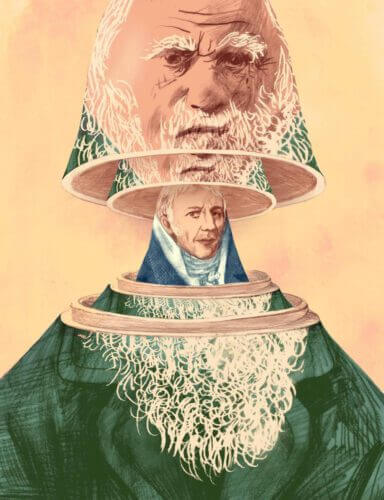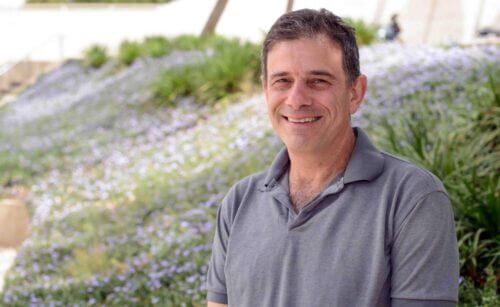Is inheritance of acquired traits from parent to offspring possible within the rules of Darwinian evolution?

A game is the collection of rules that define it - changing the rules of the game may give rise to new results. The rules of the "game" of evolution, as formulated by Charles Darwin and his successors, apply to populations of species and to the adaptation processes that occur in the population over generations. But what happens when each individual in the population hosts within it a population belonging to a different species? And what happens when the generation time of the host is 20 years, while the generation time of the guests is 20 minutes, as in the case of humans and their gut bacteria? The scientists of the Weizmann Institute of Science, in collaboration with Bar-Ilan University, tried to answer these questions without deviating from the accepted rules of the game of Darwinian evolution. Their findings show that even when these rules are followed, scenarios are obtained that were considered impossible within the framework of Darwinian evolution, such as the acquisition of a new adaptation that is inherited from parent to offspring and the selection of group traits.
It all starts with the question of whether a child can "profit" from the bitter (or sweet) experience of his parents? The French naturalist born in the 18th century, Jean-Baptiste de Lamarck, claimed that the individual can adapt to changes in his environment and pass these adaptations on to his descendants. For many years, the "Lamarckian" view was rejected by the accepted view of Darwinian adaptation through natural selection of random mutations that appear regardless of environmental conditions. However, in recent years voices have been heard calling for a rethinking, which takes into account possibilities based on discoveries in the fields of epigenetics (change in the expression or activation of genes without changing the genetic sequence) and the microbiome - the collection of microscopic creatures that live inside us and influence our condition.
Prof. Yoav Soan from the Department of Biomolecular Sciences at the Institute and his research partners from Bar-Ilan University (Prof. Yitzhak Rabin, Prof. David Kessler and Dr. Dino Osmanovich) wanted to promote the discussion independently of the decision between the Darwinists and the challengers. To this end, they presented a mathematical model that avoids controversial hypotheses by sticking to the accepted evolutionary rules of the game of natural selection. However, unlike the traditional models of "population genetics", the model takes into account evolution processes at two levels of natural selection: selection of the host individual, and a much faster selection acting on the microscopic organisms in the body. The interrelationships between the two levels support scenarios that until now were considered impossible in selection processes with only one level. "We immediately saw that an offspring may cope better with exposure to a toxin, solely thanks to the fact that its parent was exposed to this toxin - a definite Lamarkey effect", explains Prof. Soan. In order to examine mechanisms of adaptation to the Marquis, the researchers defined the Marquis using a quantitative measure that measures the improvement in the offspring's adaptation as a result of the parents' experience (as opposed to natural selection of genetic "improvement"). The quantitative approach allowed them to identify separate mechanisms that contribute to the Marquis adaptation process. In addition, it was found that the degree of Lamarckianity does not depend solely on the characteristics of the organism, but also on the environmental pressure.

Acquisition and inheritance of the rapid adaptation is possible thanks to the large gap in generation times of the bacteria compared to the host and the ability to transfer the bacterial population from parent to offspring: for example, the host's adaptation to exposure to a toxin can be obtained through bacterial evolution during the generation time of the host and even be passed directly to the offspring. When the environmental pressure continued for several generations of the host, the researchers noticed another effect that deviates from the traditional concept - "group selection". In other words, if the host has a bacterial population that better copes with the environmental stress, the host enjoys an advantage over hosts with a microbiome less adapted to the stress. "In this case, it is not a matter of selecting a particular bacterium based on its individual properties, but rather a selection according to the average of the properties in the bacterial collective," explains Prof. Suan.
The model presented by the researchers maintained maximum simplicity, including a single strain of bacteria, which is transmitted "vertically" from parent to offspring, and without the influence of the host on the design of the bacterial properties. Future studies in the field will be able to take into account many additional variables, including epigenetic processes that affect gene expression in the host and microbiome. "These variables are expected to increase the Lamarckianness of the system many times over," says Prof. Soan. "For more than 100 years it has been strongly argued that the inheritance of acquired traits from parent to offspring is not possible in a Darwinian worldview. We have shown that it is possible without going beyond the accepted rules of the game. Today I have no doubt that the vast majority of new adaptations occur during the individual's lifetime (with or without 'fixation' through selected mutations over generations). Adaptation does not wait and cannot afford to wait until some mutation occurs in a particular individual. It happens all the time - not necessarily in its genomic space."

6 תגובות
Do you really believe that this whole world was created by chance? The human body. Can such a sophisticated machine be created by chance? How can you believe this nonsense, really? One cell in the human body is so complex that there is no chance that it was created by accident. Enough with the nonsense. Only God, blessed be He, gave us life. We must not be ungrateful. And I am not ultra-Orthodox at all. But a little common sense. The great order in life shows that there is someone who arranged everything. Everything is in order Complex. Love to be a simple God. Hope you come to the truth. There is no other but Him. Praise be to His name.
Here again some "clowns" rise up and try again to tattoo the foundations of the theory of evolution that is proven to work and is certain in an attempt to buy a name and publicity without any real basis based on facts, the infrastructure of the claims is based on a mathematical model that is extremely limited in terms of the number of participating vectors. Examined, there may be some blessing in the effort Of this type, but the "curse" is much greater, studies of this type are used as a "scientific" weapon by clerics and others who wish to harm education and the study of Darwinian principles, and for that the researchers deserve all the scorn, they are also preceded by giants who fell into this trap such as Steven Gay Gold with his pseudo approach Darwinian theory "fragmented equilibrium" that was used as a powerful weapon by creationists and "intelligent planning" people for their share even though it is fundamentally Darwinian for everything
I wonder why some people go to read articles like this when their comments say so many bad things about them
Look for the movie Torah and Science by Rabbi Hagaon Yosef Mizrahi only good news and pargonim enough for the slander that destroys us from the inside there is no such thing as evolution just Darwin's regret. ?????
Stunning
I wonder how many degrees you have to accumulate in your day and end up dying stupidly